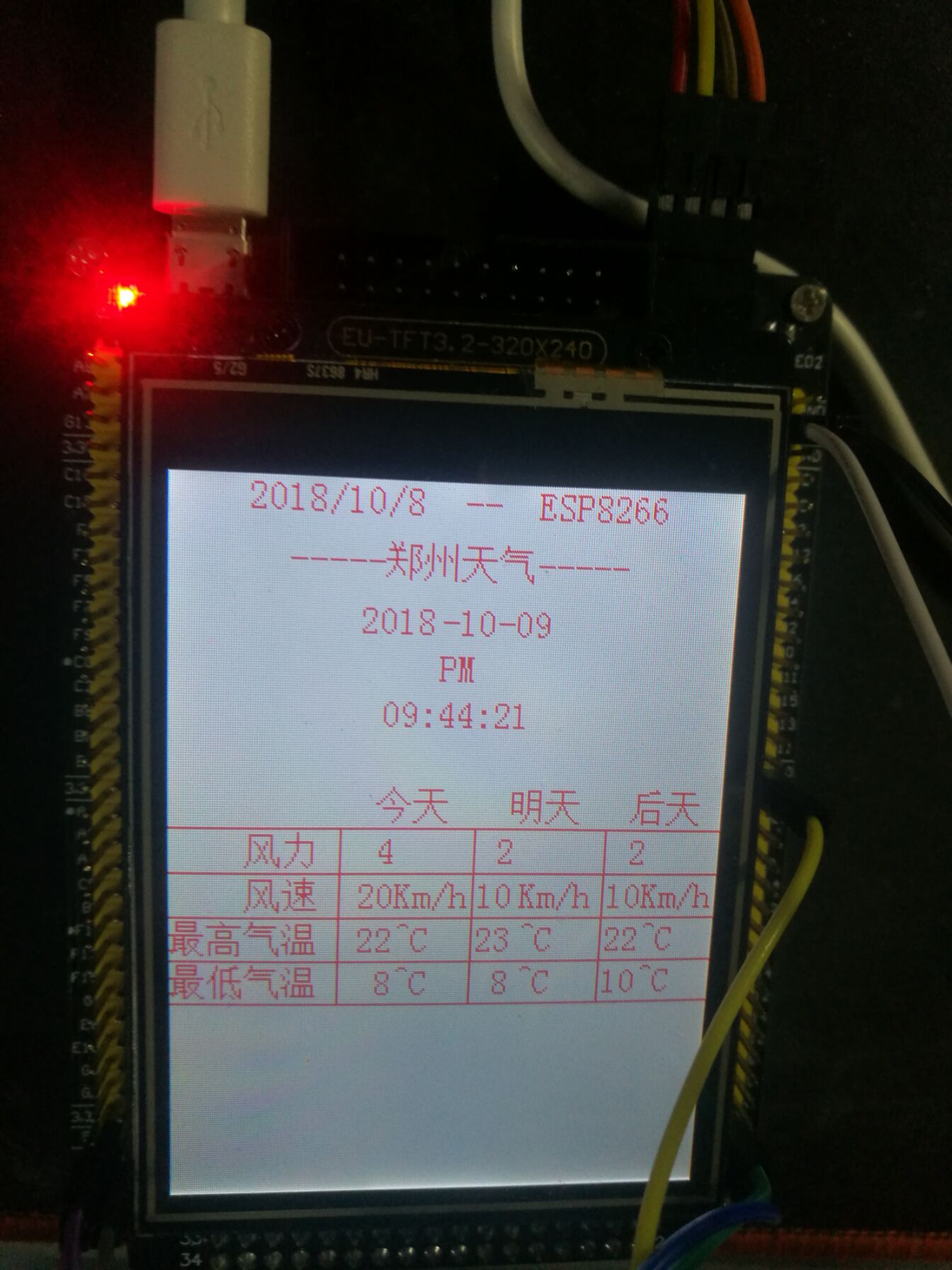First: Material preparation
stm32f103vet6, tft color screen, esp8266
II: Preparations for ESP8266
- esp8266 uses AT firmware
- Configure 8266 as STA mode with serial assistant in advance, connect to wifi, refer to website https://www.cnblogs.com/lifan3a/articles/7070028.html
3: stm32 configuration
- Using serial port 3 (PB10,PB11) configuration as follows:
<usart3.c>
//Serial Receive Buffer
u8 USART3_RX_BUF[USART3_MAX_RECV_LEN]; //Receive buffer, maximum USART3_MAX_RECV_LEN bytes.
u8 USART3_TX_BUF[USART3_MAX_SEND_LEN]; //Send buffer, maximum USART3_MAX_SEND_LEN bytes
vu16 USART3_RX_STA=0;
void USART3_IRQHandler(void)
{
u8 res;
if(USART_GetITStatus(USART3, USART_IT_RXNE) != RESET)//Received data
{
res =USART_ReceiveData(USART3);
if((USART3_RX_STA&(1<<15))==0)//If a batch of data has not been processed, no other data will be received.
{
if(USART3_RX_STA<USART3_MAX_RECV_LEN) //You can also receive data.
{
if(USART3_RX_STA==0)
{
}
USART3_RX_BUF[USART3_RX_STA++]=res; //Record the received value
}else
{
USART3_RX_STA|=1<<15; //Mandatory Markup Receiving Completion
}
}
}
}
<usart3.h>
#define USART3_MAX_RECV_LEN 1500// Maximum number of received cache bytes
#define USART3_MAX_SEND_LEN 600 // / Maximum number of sending buffer bytes
#define USART3_RX_EN 1//0, not receive; 1, receive.
extern u8 USART3_RX_BUF[USART3_MAX_RECV_LEN]; //Receive buffer, maximum USART3_MAX_RECV_LEN bytes
extern u8 USART3_TX_BUF[USART3_MAX_SEND_LEN]; //Send buffer, maximum USART3_MAX_SEND_LEN bytesSend using at command, code as follows
//Weather Connection Port Number: 80
#define WEATHER_PORTNUM "80"
//Weather server IP
#define WEATHER_SERVERIP "api.seniverse.com"
//Time Port Number
#define TIME_PORTNUM "80"
//Time Server IP
#define TIME_SERVERIP "www.beijing-time.org"
void get_time()
{
resp=mymalloc(SRAMIN,10);
p_end=mymalloc(SRAMIN,40);
p=mymalloc(SRAMIN,40); //Request 40 bytes of memory
sprintf((char*)p,"AT+CIPSTART=\"TCP\",\"%s\",%s",TIME_SERVERIP,TIME_PORTNUM); //Configure the target TCP server
u3_printf("%s\r\n",p);
delay_ms(1000);
u3_printf("AT+CIPMODE=1\r\n");
delay_ms(1000);
USART3_RX_STA=0;
u3_printf("AT+CIPSEND\r\n");
delay_ms(1000);
myfree(SRAMIN,p); //Free memory
p=mymalloc(SRAMIN,40);
USART3_RX_STA=0;
USART3_RX_BUF[0]='\0'; //empty
u3_printf("GET /time15.asp HTTP/1.1\r\nHost:www.beijing-time.org\n\n");
delay_ms(1000);
//If (USART3_RX_STA&0X8000) // / At this time, another data is received, which is weather data.
{
USART3_RX_BUF[USART3_RX_STA&0X7FFF]=0;//Adding an End Character
resp="Date";
USART3_RX_BUF[USART3_RX_STA & 0x7ff] = 0;
//printf("get_tim_srt: %s\r\n",USART3_RX_BUF);
if(strstr((char*)USART3_RX_BUF,(char*)resp))
{
resp="GMT";
p_end = (u8*)strstr((char*)USART3_RX_BUF,(char*)resp);
p = p_end - 9;
//printf("get_net_str %s\r\n",p);
nwt.hour = ((*p - 0x30)*10 + (*(p+1) - 0x30) + 8) % 24; //GMT0-->GMT8
nwt.min = ((*(p+3) - 0x30)*10 + (*(p+4) - 0x30)) % 60;
nwt.sec = ((*(p+6) - 0x30)*10 + (*(p+7) - 0x30)) % 60;
nwt.year = ((*(p-5) - 0x30)*1000 + (*(p-4) - 0x30)*100+ (*(p-3) - 0x30)*10+ (*(p-2) - 0x30));
nwt.date = ((*(p-12) - 0x30)*10 + (*(p-11) - 0x30));
if ((u8*)strstr((char*)USART3_RX_BUF,(char*) "Jan")) nwt.month=1;
else if ((u8*)strstr((char*)USART3_RX_BUF,(char*) "Feb")) nwt.month=2;
else if ((u8*)strstr((char*)USART3_RX_BUF,(char*) "Mar")) nwt.month=3;
else if ((u8*)strstr((char*)USART3_RX_BUF,(char*) "Apr")) nwt.month=4;
else if ((u8*)strstr((char*)USART3_RX_BUF,(char*) "May")) nwt.month=5;
else if ((u8*)strstr((char*)USART3_RX_BUF,(char*) "Jun")) nwt.month=6;
else if ((u8*)strstr((char*)USART3_RX_BUF,(char*) "Jul")) nwt.month=7;
else if ((u8*)strstr((char*)USART3_RX_BUF,(char*) "Aug")) nwt.month=8;
else if ((u8*)strstr((char*)USART3_RX_BUF,(char*) "Sep")) nwt.month=9;
else if ((u8*)strstr((char*)USART3_RX_BUF,(char*) "Oct")) nwt.month=10;
else if ((u8*)strstr((char*)USART3_RX_BUF,(char*) "Nov")) nwt.month=11;
else if ((u8*)strstr((char*)USART3_RX_BUF,(char*) "Dec")) nwt.month=12;
printf("nwt.year = %d\r\n",nwt.year);
printf("nwt.month = %d\r\n",nwt.month);
printf("nwt.date = %d\r\n",nwt.date); //Get data 28
LCD_ShowxNum(78,50,nwt.year,4,16,0);
LCD_ShowChar(112,50,'-',16,0);
LCD_ShowxNum(120,50,nwt.month/10,1,16,0);
LCD_ShowxNum(128,50,nwt.month%10,1,16,0);
LCD_ShowChar(136,50,'-',16,0);
LCD_ShowxNum(144,50,nwt.date/10,1,16,0);
LCD_ShowxNum(152,50,nwt.date%10,1,16,0);
printf("nwt.hour = %d\r\n",nwt.hour);
printf("nwt.min = %d\r\n",nwt.min);
printf("nwt.sec = %d\r\n",nwt.sec);
if(nwt.hour >12)
{
nwt.hour = nwt.hour - 12;
LCD_ShowString(112,70,200,16,16,"PM");
}
else
LCD_ShowString(112,70,200,16,16,"AM");
LCD_ShowxNum(88,90,nwt.hour/10,1,16,0);
LCD_ShowxNum(96,90,nwt.hour%10,1,16,0);
LCD_ShowChar(104,90,':',16,0);
LCD_ShowxNum(112,90,nwt.min/10,1,16,0);
LCD_ShowxNum(120,90,nwt.min%10,1,16,0);
LCD_ShowChar(128,90,':',16,0);
LCD_ShowxNum(136,90,nwt.sec/10,1,16,0);
LCD_ShowxNum(144,90,nwt.sec%10,1,16,0);
//printf("uddate:nettime!!!");
myfree(SRAMIN,resp);
myfree(SRAMIN,p_end);
}
}
USART3_RX_STA=0;
USART3_RX_BUF[0]='\0'; //empty
//Printf ("% s r n", USART3_RX_BUF);// Print BUF data
u3_printf("+++"); //Withdrawal of Pass-through Mode
delay_ms(1000);
myfree(SRAMIN,p); //Free memory
printf("ALL end ....................\r\n"); //End of analysis
}
void get_weather()
{
printf("ALL start .......................\r\n");
p=mymalloc(SRAMIN,40); //Request 40 bytes of memory
sprintf((char*)p,"AT+CIPSTART=\"TCP\",\"%s\",%s",WEATHER_SERVERIP,WEATHER_PORTNUM); //Configure the target TCP server
u3_printf("%s\r\n",p);
delay_ms(1000);
u3_printf("AT+CIPMODE=1\r\n");
delay_ms(1000);
USART3_RX_STA=0;
u3_printf("AT+CIPSEND\r\n");
delay_ms(1000);
USART3_RX_STA=0;
USART3_RX_BUF[0]='\0'; //empty
u3_printf("GET https://api.seniverse.com/v3/weather/daily.json?key=pqe1fgv45lrdruq7&location=zhengzhou&language=zh-Hans&unit=c&start=0&days=5\n\n");
delay_ms(1000);
if(USART3_RX_STA&0X8000) //At this point, the data is received again, for the weather data.
{
USART3_RX_BUF[USART3_RX_STA&0X7FFF]=0;//Adding an End Character
}
parse_3days_weather(); //Analysis of weather
//Printf ("% s r n", USART3_RX_BUF);// Print BUF data
u3_printf("+++"); //Withdrawal of Pass-through Mode
delay_ms(1000);
myfree(SRAMIN,p); //Free memory
printf("ALL end ....................\r\n"); //End of analysis
}JSON data parsing refers to God from the Internet. Readers can learn it systematically.
Don't talk too much nonsense.
